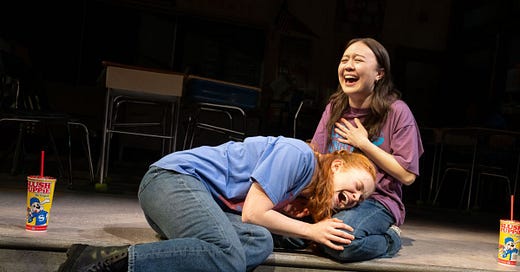Sadie Sink and Amalia Yoo. Photo: Julieta Cervantes
The title is a bit of a spoiler – but didn’t we all finger the real culprit at one point during our own moody adolescences? Arthur Miller may have intended to pillory Joseph McCarthy amid his anti-Commie inquisition, but we – girls especially – tended to read into the 1953 script a critique of the lying, hypocritical adults running our lives. In the 60s, “hysteria” (acting out) would become a given, rebellion a requirement.
Even so, it’s a thrill to see playwright Kimberly Belflower (at 37, a Broadway newcomer) dig deep into this sub-scenario, by positing a class of high-school juniors in a one-traffic-light Alabama town in 2018 – Year 2 in the now-overshadowed initial reign of the faux-Evangelical operative currently engaged in a take-all-prisoners rout of democracy.
The students in the play – deftly, insightfully directed by Danya Taymor – feel fortunate in having one of those “relatable” dream teachers. The very embodiment of tutelary engagement and enthusiasm, Mr. Smith (Gabriel Ebert) appears to take the teens’ as-yet-inchoate yearnings seriously. Drama Club fell prey to budget cuts? He’ll turn their English assignment participatory. With every word, he’s literally bouncing with enthusiasm.
The nine students signing on represent a sampler of teen types. Recent Atlanta transplant Nell is intent on making an impression (Morgan Scott, segueing from Jaja’s Africa Hair Braiding, easily does, with every clever quip). Conversely, class dweeb Beth (Nina Strazza) can get a bit irritating and one-note: think SNL’s Lisa Loopner (Gilda Radner, immortal) without the awkward charm.
As a character, Raelynn (Amalia Yoo) is a bit of a sleeper. Three months earlier, Raelynn’s boyfriend (Hagan Oliveras playing a standard Good Old Boy in training) had sex with her best friend, Shelby – a character as yet unseen onstage, but a whirlwind of tempestuous emotion when she resurfaces at school.
Sadie Sink (famed for her role the Netflix series Stranger Things) has the wherewithal to tap every gradation on the Richter scale of teenage intensity: her portrayal is at once feral and translucent. The intimate scene in which Shelby tries to regain Raelynn’s trust (“You know how sometimes you need to dig a deeper hole?”) is almost as riveting as the girls’ ultimate dance-out, a kind of ritual cleansing.
You’ve read the title; you know what’s coming. What’s impossible to foretell is how invigorating and liberating the reinterpreted resolution will feel.
Broadway, to May 10




